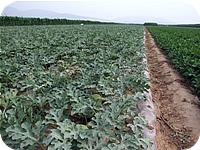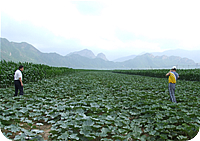| Quality Assurance In China |
| Objectives |
To deliver test results in time and coordinating with other functions of the supply & delivery chain for the quality seed production and timely supply of quality seed. |
| Seed Test Report |
| Major activities of Quality Assurance pertain to seed testing in laboratory and in the field and also to visit fields during seed production. For this we have a team highly qualified and experienced professionals to submit seed test report for every order on time. |
| Sampling |
To obtain a random sample for testing it is always best to take samples from different parts of the bag or container. If the grain to be tested is from a seed lot that contains more than one bag, samples must be taken from several bags. A good rule of thumb for determining how many bags to sample is to take samples from a number of bags that represents the square root of the lot size. For example if the lot contains nine bags, then sample at least three bags. If the lot contains 100 bags, then sample at least 10 bags. |
| Purity Test |
. |
The purity test include the genetic purity test and the physical purity test. The seeds produced by grower are subjected to purity test either by laboratory or by growing plants in field. TECHPARK is being supported by laboratories of administration of seed in China for lab purity test which is quicker as compared to field test. Actually, TECHPARK mostly take tests in the field after harvest at Hainan, China from august to november every year. TECHPARK has an excellent farm at different locations to undertake field purity test each year |
|
| Germination Test |
Lab of TECHPARK has senior facilities to test germination of samples of vegetable crops. Laboratory is equipped with Germinators and Walk in Chamber needed for the test.The purpose of laboratory testing of seed germination is to assess seed quality or viability and to predict performance of the seed and seedling in the field. Seed processed for sale must be tested by TECHPARK qualified laboratory under the standard of ISTA and the Association of Official Seed Analysts Rules for testing seeds. Several different kinds of testing are available depending on the type of seed to be tested, the conditions of the test, and the potential uses of the seed. The most common tests are the warm germination test, cold germination test, accelerated aging test, and the tetrazolium test. Each test is designed to evaluate various qualities of the seed. Factors that can affect the performance of seed in germination tests include; diseased seed, old seed, mechanically damaged seed, seed stored under high moisture, and excessive heating of seed during storage or drying. In most cases a seed treatment will improve germination of seed only if the poor quality is due to seed-borne disease. |
 |
|
| Moisture Test |
. |
Laboratory is equipped with sophisticated Moisture Meter for quick determination of seed moisture level. The available facilities have capacity to test a great lot samples per annum. The functions support the operation for quality seed storage and eliminate the chances of seed deterioration after packing on account of unsafe moisture.Seed is dried by an air oven method, and the loss of weight that occurs during drying is calculated as the percentage moisture content. Seed moisture content has an important influence on the retention of germination capacity during storage. |
|
|
| Seed Weight Test |
Seed weight tests may be carried out on any seedlot, the results usually being expressed as 'thousand seed weight' (TSW) in grams. TSW information is useful in determining precision sowing rates for vegetable seeds. |
| Seed Vigor Test |
See vigour tests are available for certain types of seed, where it is known that the test results are linked to the ability of seed lots to establish under stress conditions in the field, or survive in less than ideal storage conditions. |
| Seed Health Test (Disease Test) |
Diseases carried by seed are known as seed-borne diseases and may be caused by pathogenic micro-organisms such as fungi, bacteria, viruses or nematodes (collectively known as pathogens). Pathogens are detected and identified in laboratory seed health tests. |
| View a listing of our current vegetable seed products >> |